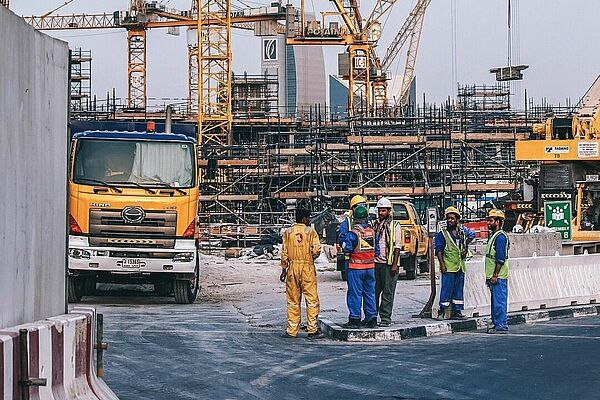Dr Tilman Altenburg conducts research at the German Institute of Development and Sustainability (IDOS) into how the respective strengths of companies in Germany and its partner countries can best be combined to advance transformation of the economy on both sides. How can secure new economic relationships be established in a world that is undergoing radical change?
‘We must be clear about our strategic goals.’

AWE: Dr Altenburg, radical technological changes and a shift in the global economic centres of power, in particular the rise of China, are having an impact on the private sector – both here in Germany and in the Global South. Many companies are now looking for different strategies and partnerships to put their supply chains and business models on a secure footing again. Can development cooperation promote partnerships that benefit German companies, our overall interests as a country and those of our partner countries in equal measure?
Altenburg: Yes, it can. Let me give you an example. International value chains have to become carbon neutral. This is essential for the climate – and the various parties involved can benefit. Brazil, for example, has iron ore and renewable energies in abundance. This means that intermediate products such as sponge iron can be produced in a way that is both cost-effective and green. The country can therefore increase its added value while reducing the costs of green steel for German industry. This benefits all technology-intensive companies in the special steel and steel end-products sector. Development cooperation can promote this, for example by encouraging technological cooperation and the development of common standards and by facilitating business partnerships.
Using development policy to design partnerships for mutual benefit
AWE: But partnerships like these have to be built up systematically over a long period of time. What needs to change in practice?
Altenburg: We have to be clear about our strategic goals. In Brazil, for example, our interests are in industrial decarbonisation, access to critical raw materials and common free trade. In Kenya, we’re impressed by the availability of low-cost IT skills, which allow us to outsource business processes cost effectively there. In Morocco, we’re interested in energy and migration partnerships. We then need to shape development policy in these priority areas in ways that offer benefits to both sides.
This is achieved by bringing together various actors – the relevant political departments, for example – at both national and international level.
AWE: Can you give us an example of one of these business partnerships?
Altenburg: Certainly. Take the climate-neutral transformation of global megacities, for example. These cities are currently booming, particularly in East and South Asia and in Africa. The cement and steel production required for this leaves a climate footprint that far exceeds what our planet can afford today. Cities there are designed for individualised mobility by car. So by offering partnership programmes that promote sustainable construction and mobility – and by involving German companies in programme design at an early stage – we can increase effectiveness and make it easier for German companies to initiate business. A partnership of this kind might involve urban planners, firms of architects and mobility providers, for example.
International cooperation and business partnerships make an important contribution to security and stability
AWE: Is that even feasible, given the tense geopolitical climate we have at present? The focus today is more on strengthening our defence capabilities.
Altenburg: The desire for greater security and stability is widely felt, which is understandable. But security cannot be guaranteed solely by military means, nor by each country focusing solely on its own economic interests and clinging to supposedly tried-and-tested methods. International cooperation and business partnerships make an important contribution to security and stability. And not just by stabilising the economy and society in the long term. They also do this by opening up new opportunities in the short and medium term to drive forward the necessary adaptation of the economy to changing conditions, by creating new access to raw materials, knowledge and technology, and by working together to advance the development of sunrise industries and future technologies.
Published on

